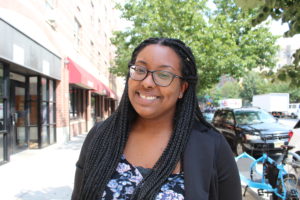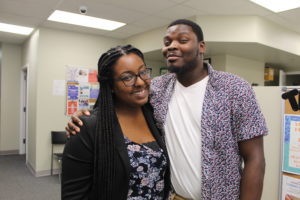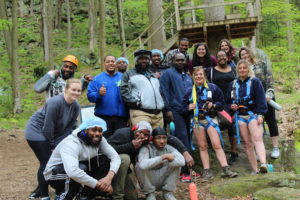
Shaquala Santiago, GOSO Senior Director of Client Programs
GOSO is able to reach hundreds of justice involved young men each year because we have a strong team of dedicated and passionate individuals who show up each day, ready to hit the ground running. All of our team members bring unique talents and perspectives to our organization, and our work wouldn’t be possible without each person’s contributions.
This week, we’re introducing you to Shaquala Santiago! Shaquala started at GOSO five years ago as a Career Manager, she then moved on to become a Senior Career Manager, and finally assumed her current role as our Senior Director of Client Programs this year.
Shaquala shared some of her most memorable moments at GOSO, why she loves what she does, and how GOSO has impacted her. Read our interview with her below:
Why did you decide to work at GOSO?
I wanted to be able to work with communities similar to ones I grew up in and make an impact there so it was important for me to focus on a population that I was familiar with. I didn’t know I would fall in love working with the criminal justice population, but I did. So I found my thing.
What is your role at GOSO?
As Senior Director of Client programs, I make sure that the programming here is what our participants need — I strive to address their actual needs, not assumed needs. In other words, not just programming we think is good for them. And I also run our Leaders in Training (LIT) program, which is our way of allowing guys to take what they’ve learned and give it back to the GOSO community and their community as a whole.
What professional and/or personal experiences influence the work you do at GOSO?
My personal experience of growing up in New York City has influenced my work. I grew up in a low-income neighborhood myself and seeing the poverty and violence, and the lack of community support around me influenced my decision to go into social work and ultimately work with the population I work with.
I’ve been to organizations where the programming was very cookie-cutter, so it was important to me that our participants had a voice in defining what their services look like, which is kind of how I ended up here.

Shaquala and Antwan G., who is a LIT Ambassador and a participant Shaquala has worked with for many years.
What’s your favorite part about your job?
I like that no day is the same. With our participants, especially their age group (16-24), you never know what to expect when you walk in, in the morning. And I laugh. I literally laugh every day with my participants.
The moments that really make me step back and think, “I love what I do,” is thinking about how resilient our participants are. They discover resilience that they didn’t even know they had. When I get to be a part of helping them unleash that resilience — that for me is the most surreal experience. Those “Ah-ha!” moments are amazing.
What is one of the biggest challenges you face in your work?
Being a clinician of color is challenging, especially when you see other people of color struggle to try to attain their dreams. It’s hard when you see they are not succeeding and you want that so bad, it can make you feel sympathetic to what they are going through. But at the same time, I think this is why I do what I do and why I keep on going even when our guys want to give up. Because I know they can achieve their goals despite their background and where they’ve come from. I want them to feel that freedom and success.
Can you share a story of a meaningful moment you had while working at GOSO?
This spring, our LIT retreat when we went to Club Getaway was incredibly meaningful. We took the LIT ambassadors outdoors and into the woods! It was amazing to see them experience that for the first time. Seeing them conquer their fears for the days they were there was by far my favorite time at GOSO. Although they were afraid of certain things, they were all able to debrief after and see the meaning in that. Moments like that remind me why I do what I do even if it’s just for a weekend.
Why are you passionate about the work that GOSO does?
I think I’m passionate because the work we do at GOSO isn’t only on a micro-level, it’s on a macro-level. We are creating community change and paving the way for the future generations to implement that change. It’s not just about our participants, we’re able to influence criminal justice reform.
It’s important for other people to get involved with our work because we are essentially supporting the people who go back into our community. We can’t expect our communities to change if we are not helping others to be whole people in society. The way that our prisons are set up doesn’t allow for true rehabilitation. If we want to be a society where we seek to transform the way we think and practice then it has to start somewhere.
What is the most important personal attribute that you bring to your job?
My spunk — I’m really spunky! That drives my passion for my work, and I’m not afraid to jump in and get my hands dirty or be vocal about the things that I think need to be changed. And I’m really direct with the guys, so they always know they can come into my office and I will give them the truth.

Group shot from the LIT Program Retreat at Club Getaway.
What’s a piece of advice that you’ve wanted to pass on to participants?
I would say simply: Never give up. There is so much beauty in our world, and even when you have to look in the darkest corners for it, it’s there. And even though you have to go out and seek it, it’s there. And we have to want it enough to keep on that road, that journey. And sometimes our participants forget that they have to keep on going. And I never want them to give up.
What is something you’ve learned from being here and working with participants?
To go with the flow. Life is not black and white, as much as you may want it to be. Sometimes you have to sit in that grey area and work with what you have.

